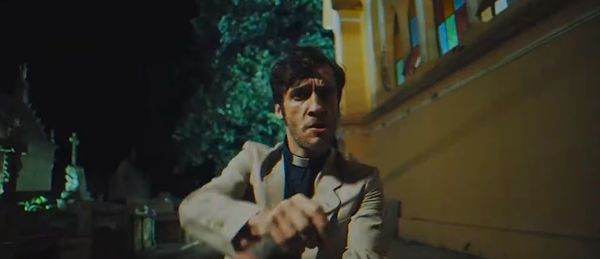Eye For Film >> Movies >> Skull: The Mask (2020) Film Review
Skull: The Mask
Reviewed by: Jennie Kermode

Whenever anyone tells you that they don't make horror movies like they used to, tell them to look to South America, where the art of the OTT supernatural slasher is still very much alive. This particular treat hails from Brazil, and back in the day it would have found a natural home on the UK government's Video Nasty list. It's brazen, bloody and completely committed, almost operatic in style; and whilst it may have artistic shortcomings, it has been made with an infectious enthusiasm that will have genre fans cheering.
The plot, such as it is, concerns the unearthing of an ancient skull mask whose precise origins have been forgotten, but which is dimly connected with a god named Tahawantinsupay. After a brief episode during which it takes centre stage in a bloody occult ceremony, it's packed up and shipped back to San Paolo, where it's supposed to become a museum exhibit. Before this can happen, it possesses a body and goes on a killing spree. It's implied that if it can arrange enough ripping out of hearts, the resulting blood will filter through to Tahawantinsupay in some kind of extra-dimensional space, enabling him to manifest directly in our world.
Who can stop this madness? Certainly not the museum's owner (Ivo Müller, who has a wonderfully skull-like face of his own), a man with sinister plans for the ancient artefact; nor the local priest, who has been trained to fight all manner of supernatural evils but no longer considers that to be the Church's role (there may be a little bit of political subtext here). No - it is instead left to his brave but poorly prepared assistant and to police detective Beatriz Obidias (Natallia Rodrigues), who has been charged with investigating the mystery of all those excardiated corpses.
Directors Armando Fonseca and Kapel Furman, who previously worked together on 2016's Uptake Fear, make an interesting combination. Fonseca has a background in documentary which contributes something to the narrative structure of this film, especially in the first half, whilst Furman's extensive history as a VFX artist specialising in gore ensures that there is never any lack of visual spectacle. Their style is lurid and intense, perfectly complemented by Fernando Arruda's score, and the pace never slackens. There's a little bit of nudity, as one would expect from the genre, but this masked killer has no preferred type - anyone can be a victim as he blazes through the film destroying everything in his path.
Full of vivid imagery evoking religious rituals past and present, the film draws on ancient tensions between indigenous peoples and encroaching colonials. Its savagery is not altogether gratuitous; rather, it evokes a horror rooted in the otherness of the god and his cult, the suggestion that such ways of thinking never quite died out and, more obliquely, the suggestion that this is in part an act of vengeance or a natural consequence of what was done in the name of empire, a supernatural monstrousness inspired by human action. It has the purity of real madness. No attempt is made at further explanation; there is no power in reason.
Shot in and around Sao Paolo, Skull stages its horrors against a background of exquisite religious architecture and run-down urban spaces. A sub-plot concerns itself with stolen Bolivian children, reminding us of the horrors of real life and suggesting that they too might intersect in places with this existential terror. The acting is ropy, the dialogue clumsy and rushed, but as to what most genre fans are looking for, Skull delivers it in spades.
Reviewed on: 24 May 2020

















